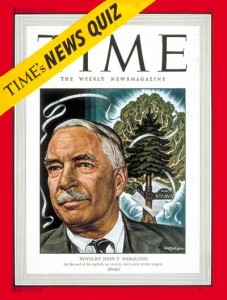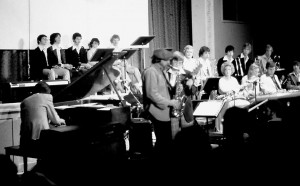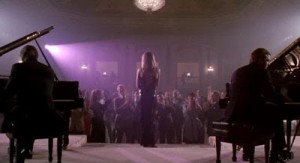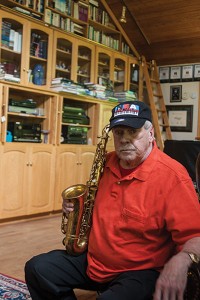I’m the kind of person who, when he enters a house for the first time, is irresistibly drawn to its bookshelves. Rightly or wrongly, I assume that their contents (or lack of same) will reveal much about the occupant. This irresistible conditioned reflex operates even when I’m in a hotel room or other public place where books are on display. Yes, I know that they were probably bought by the foot from some books-as-decoration outfit, but I still find them fascinating to peruse.
 I flew down to West Palm Beach on Monday to see a show and give a couple of talks, and I opted to stay at Casa Grandview, a B&B in Grandview Heights, a wonderfully quaint historic district that is, like so many Florida neighborhoods, a glorious mishmash of random architectural styles. The front room of my cozy, comfortable suite, an old-fashioned bachelor pad that the amiable owners have dubbed “the Man Cave,” is dominated by a massive bookcase. No sooner did I settle in than I started examining its contents. Needless to say, I didn’t expect to find anything particularly interesting therein, but along with the usual titles by the ubiquitous likes of Dick Francis and John Grisham, it turns out that a very considerable number of the books in the Man Cave are…well, not quite what you’d expect to stumble across in a B&B.
I flew down to West Palm Beach on Monday to see a show and give a couple of talks, and I opted to stay at Casa Grandview, a B&B in Grandview Heights, a wonderfully quaint historic district that is, like so many Florida neighborhoods, a glorious mishmash of random architectural styles. The front room of my cozy, comfortable suite, an old-fashioned bachelor pad that the amiable owners have dubbed “the Man Cave,” is dominated by a massive bookcase. No sooner did I settle in than I started examining its contents. Needless to say, I didn’t expect to find anything particularly interesting therein, but along with the usual titles by the ubiquitous likes of Dick Francis and John Grisham, it turns out that a very considerable number of the books in the Man Cave are…well, not quite what you’d expect to stumble across in a B&B.
Here are some of the less likely titles:
Catherine Drinker Bowen’s Yankee from Olympus: Justice Holmes and His Family
Short Novels of Colette
Isak Dinesen’s Out of Africa
The Faulkner Reader
Kenneth Fearing’s The Big Clock
Edith Hamilton’s The Greek Way
The Short Stories of Henry James, edited by Clifton Fadiman
John Keegan’s The First World War
Laurie Lee’s Cider With Rosie
 John P. Marquand’s B.F.’s Daughter, So Little Time, Women and Thomas Harrow, and Your Turn, Mr. Moto
John P. Marquand’s B.F.’s Daughter, So Little Time, Women and Thomas Harrow, and Your Turn, Mr. Moto
André Maurois’ Disraeli
Dorothy Parker’s Not So Deep as a Well: Collected Poems
C. Northcote Parkinson’s Parkinson’s Law
The Abby Aldrich Rockefeller Folk Art Collection
Sam Tanenhaus’ Whittaker Chambers
Carl Van Doren’s The Great Rehearsal
Yes, I’ll be more than glad to return to New York and Mrs. T—I always am—but between the books in the Man Cave and the tasty breakfasts cooked to order each morning, I’d be perfectly happy to spend a few more days by Casa Grandview’s pool, reading at random and basking in the Florida sunshine.
UPDATE: I learned at breakfast that the owner of Casa Grandview bought all of the books himself. We chatted about Marquand, James Gould Cozzens, and Nevil Shute as I ate my eggs Benedict. I’m definitely coming back here.
To read my 1987 Commentary essay about John P. Marquand, go here.




 Hence it was with wonder and delight that I received a snapshot via e-mail last week. It was taken in 1978 at a concert given in Liberty, Missouri, by
Hence it was with wonder and delight that I received a snapshot via e-mail last week. It was taken in 1978 at a concert given in Liberty, Missouri, by  Looking back on my far-off days as a jazzman, I find myself thinking of Steve Kloves’
Looking back on my far-off days as a jazzman, I find myself thinking of Steve Kloves’  As for Phil Woods, he’s still playing regularly at the age of eighty-three, albeit with reduced endurance, since he now suffers from emphysema, the consequence of a lifetime of chain smoking. “Emphysema is nature’s way of saying you’ve been playing too many goddamn notes,” he recently told an interviewer.
As for Phil Woods, he’s still playing regularly at the age of eighty-three, albeit with reduced endurance, since he now suffers from emphysema, the consequence of a lifetime of chain smoking. “Emphysema is nature’s way of saying you’ve been playing too many goddamn notes,” he recently told an interviewer.